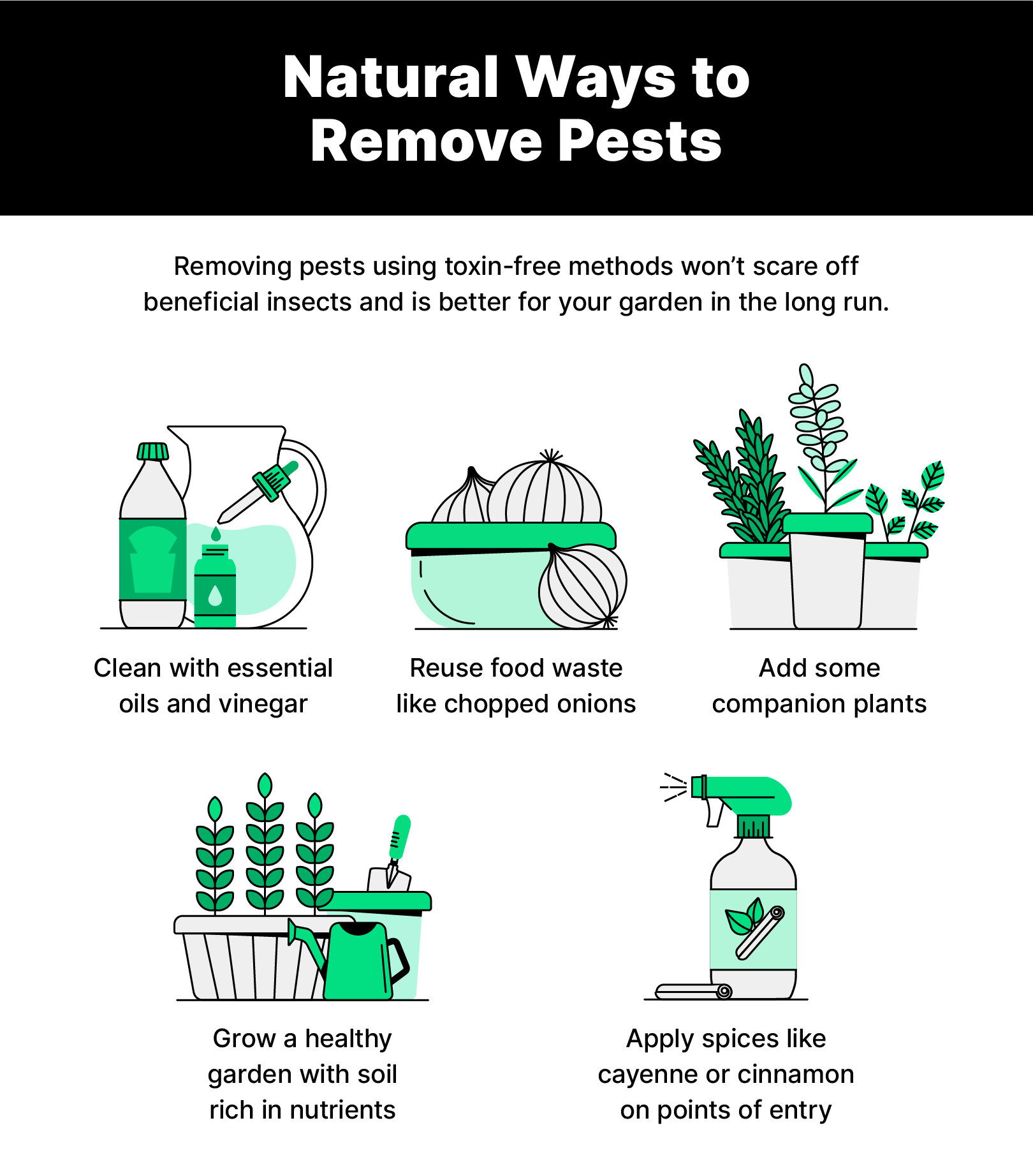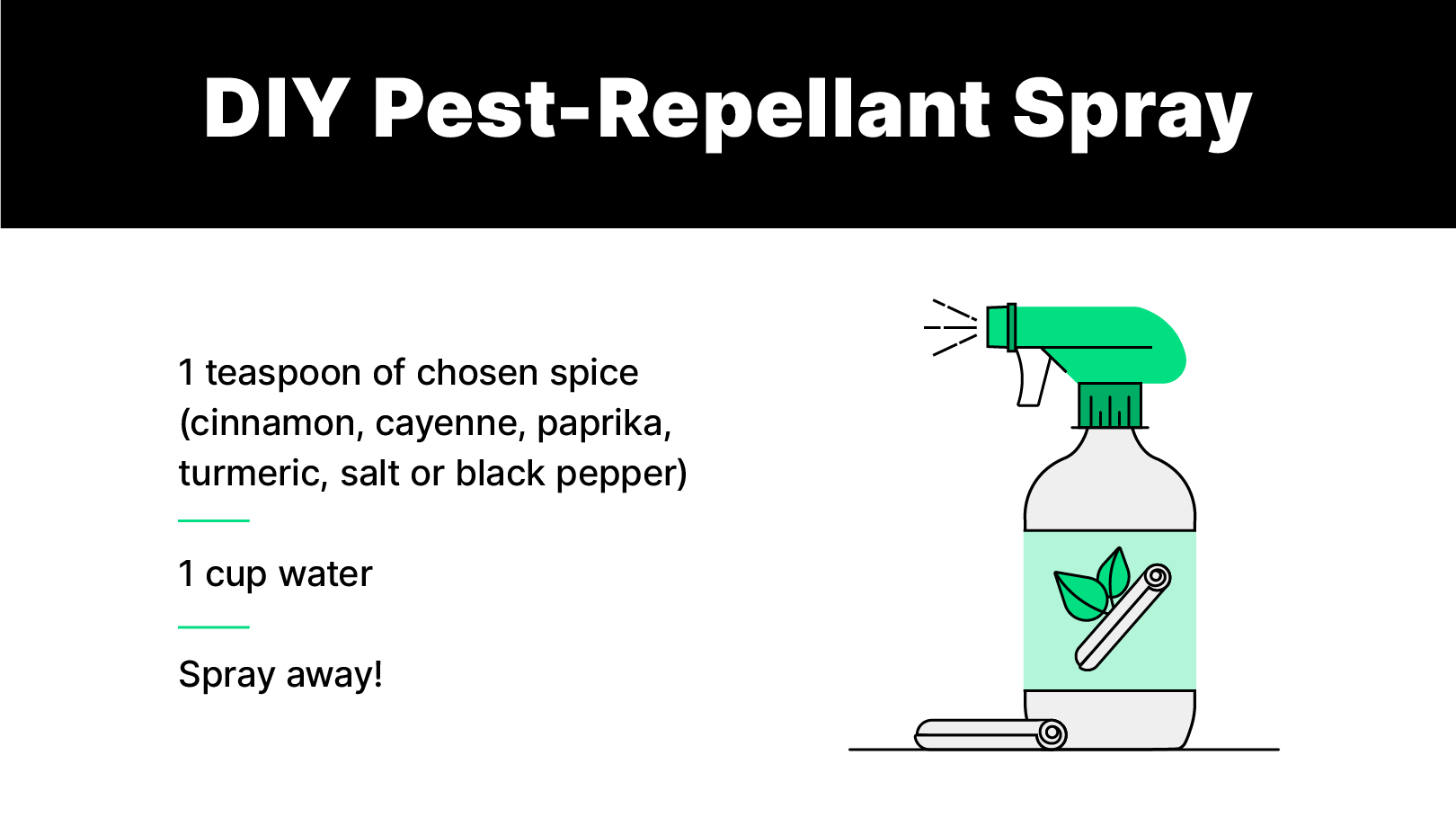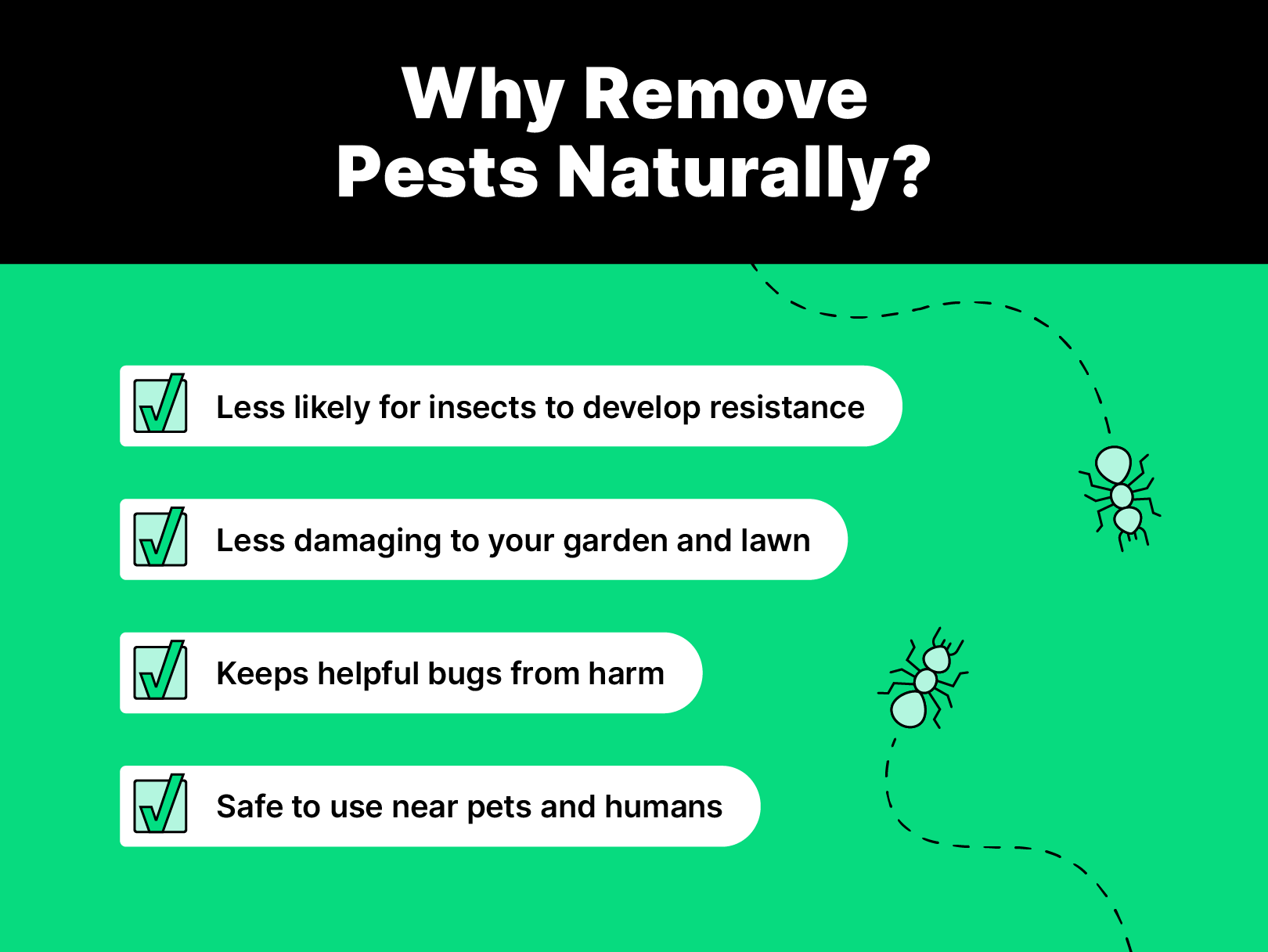Homeowners Guide to Eco-Friendly Pest Control

While there are plenty of reasons to start your own garden, housing pests usually isn’t one of them. Once you discover uninvited pests in your lawn, garden, or even your home, your first thought might be to call a local pest control company. However, harsh pesticides can be dangerous to pets, children, and the atmosphere — often causing more trouble than it's worth.
Opting for eco-friendly pest control through natural and less harmful methods is a much more convenient way to pest-proof your home. This way, you can avoid the costly process of extermination and relocation until the bugs are gone. In this guide, we’ll walk you through exactly what eco-friendly pest control is, how it works, and how to start using it in your home.
11 ways to remove pests naturally
Remove pests from your home and garden naturally using scents, plants, and essential oils that repel them. You can search for eco-friendly pest removal companies to do it for you, or you can make it a DIY project using the different methods below.

1. Grow a healthy garden with soil rich in nutrients
Healthy gardens are soil rich in nutrients. You can easily add natural fertilizer by using food waste you would normally compost, to your soil. Opt instead for a healthy garden that will attract beneficial insects — instead of harmful ones. Using a pesticide will eradicate all bugs — even the good ones that are healthy for your yard or garden.
2. Plant pest-control herbs
The types of plants in your garden can have a huge impact on the bugs they attract. Adding herbs like mint, basil, lavender, and rosemary to your garden can help deter bugs you don’t want — and can be a great addition to food and drinks. Not only that, but these herbs are companion plants — plants that grow together with mutual benefit. Talk about a win, win.
If herbs aren’t your thing, other examples of natural plants that have pest-repelling properties include:
- Petunias
- Chrysanthemums
- Lemongrass
- Clover
- Eucalyptus
- Marigolds
3. Use spices to ward off pests
Once you’ve found the pests' point of entry, you can use powerful spices (like the ones below) on your window sills to deter creepy crawlies from entering. To do this, you can make a mixture of one teaspoon of the spice of your choice combined with a cup of water in a spray bottle and apply this to your window sills or door frames.
Spices to use include:
- Cinnamon
- Cayenne
- Paprika
- Turmeric
- Salt
- Black pepper
- Bay leaves
- Cloves

4. Clean using essential oils and vinegar
Another way to ward off pests is to use natural cleaning products you make at home. If you’re a DIYer at heart, make your own pest control by mixing 1 cup water, ¼ cup vinegar, and 1 teaspoon of your chosen essential oil in a spray bottle. If you don’t have essential oils on hand, you can use citrus peels soaked in water instead. The cleaning ingredients will remove food residue and the strong smell will deter pests.
Essential oils you can use in your cleaning spray include:
- Peppermint
- Lavender
- Eucalyptus
- Citronella
- Lemongrass
- Tea tree
5. Use food waste as an insect repellent
Using food waste to repel insects can be as easy as taking your leftover citrus peels, cutting them into smaller pieces, and adding them to your garden’s soil as fertilizer. You can also put the citrus peels on the counter or window sills to deter pests.
Got leftover chopped onion from lunch? Combine the onion with some water in a bowl and keep it on your countertop to ward off mosquitos. But wait, there’s more! You can even use ground coffee on the perimeter of your home or along window sills to repel ants, mosquitos, wasps, or bees since they hate the strong smell.
6. Try boric acid
Boric acid has been used since the 1940s to control roaches and is classified as a natural insecticide. To use this natural pest control, apply boric acid to the areas insects live or where you think they’re coming in from outside. Make sure to be extra careful when using it and follow the instructions to prevent any bothersome side effects.
7. Use humane traps to relocate rodents
Humane traps are devices you can use to capture and free rodents you find in your home. Using these traps ensures no creature is harmed in the process of pest removal. To avoid the hassle of fumigation, you can set pests free with humane rodent traps.
8. Attract birds to do your pest removal for you
Birds and other small animals are great for your garden since they often help get rid of slugs, caterpillars, snails, and other pests. Attract birds using bird feeders and nesting boxes, which can also make your backyard a little oasis.
9. Use natural pesticides
Natural pesticides like pyrethrum sprays have been used for hundreds of years as an organic version of pest control. This biodegradable pest control solution has very low toxicity to humans and is safe to use in your garden. Simply spot-treat the parts of the plant that you see are affected.
10. Try microbial insecticides
Microbial insecticides are microorganisms that target pests in an eco-friendly way. One of the most common microbial insecticides you can use in your garden is Bacillus thuringiensis, or Bt. Get some gloves, long sleeves, and full pants before you spray your plants with this natural pesticide. Bt is non-toxic for humans and pets, but make sure to wash your hands thoroughly after applying it to avoid allergies.
11. Sprinkle diatomaceous earth
With gloved hands, sprinkle diatomaceous earth (or DE) around the baseboards of your home or wherever else you’ve found insects to remove unwanted pests quickly. DE helps get rid of insects like caterpillars, aphids, slugs, whiteflies, snails, trips, and root maggots. It’s best not to inhale it, so make sure to wear a mask and follow any other safety instructions recommended by the manufacturer.
5 benefits of eco-friendly pest control
Now that you know the best methods to remove pests from your home and garden naturally, you might be wondering what the benefits of using eco-friendly pest control methods are versus traditional pesticides and fumigation. Natural pest control methods boast a number of benefits, have proven to be safer to use around pets and humans, and can even help protect the integrity of your garden and home in the long run.

1. Better long-term results
When pest control companies come to fumigate your home time and time again, insects can develop a resistance to the pesticides they use. Natural methods of pest removal make it difficult to develop a resistance. These methods will ultimately result in money saved and better long-term results for your home.
2. Less damaging to your garden and lawn
Pest removal can take several rounds of treatment, which ends up damaging your garden and lawn. This can even cause issues with regrowth in the future since the toxins escape into the atmosphere and soil over time.
3. Doesn’t harm beneficial insects and animals
There are good bugs and bad ones — it’s best to keep the good ones around since they serve as natural forms of pest control. Chemical pesticides remove all bugs, even the good ones. Pesticide use has been linked to plummeting honeybee populations. It also kills other pollinators like butterflies, hummingbirds, lizards, and small mammals. It’s best to use natural methods in order to protect the wildlife that supports your garden and lawn ecosystem.
4. Safe to use near pets
Our furry friends can also be negatively impacted by toxic pesticides, but natural pest control options like DE, citrus, essential oils, and companion plants are all safe to use around pets.
5. Doesn’t disrupt your home
Fumigation requires you to evacuate your home, clear your fridge and cover your fabrics. Eco-friendly methods of pest removal don’t require such drastic methods and can even be done on a regular basis without having to change anything at home. Chemical pesticides can also linger in your home, so avoiding them altogether is often your best bet.
Downsides of traditional pest control
Chemical pesticides come with toxins that prevent your furry friends from enjoying your backyard. They can also pose dangers to people as well, which is why more and more homeowners are opting for the methods we covered above. Although natural pest control methods can take longer, it is relatively low maintenance — especially if you’ve decided to xeriscape your lawn.
Protect your home from pests with insurance
Maintaining your green spaces shouldn’t be difficult. By using these natural methods, you can protect your home and garden in an eco-friendly way. Home insurance shouldn’t be difficult either. Let Hippo do the work for you and give you the protection you deserve.
Learn more about our home insurance options to see what’s covered.




